As a new world order takes shape before our eyes, the author, in a recent lecture, considers how Europe can best make use of its position on the eastern edge of the Atlantic world and the western edge of Eurasia.
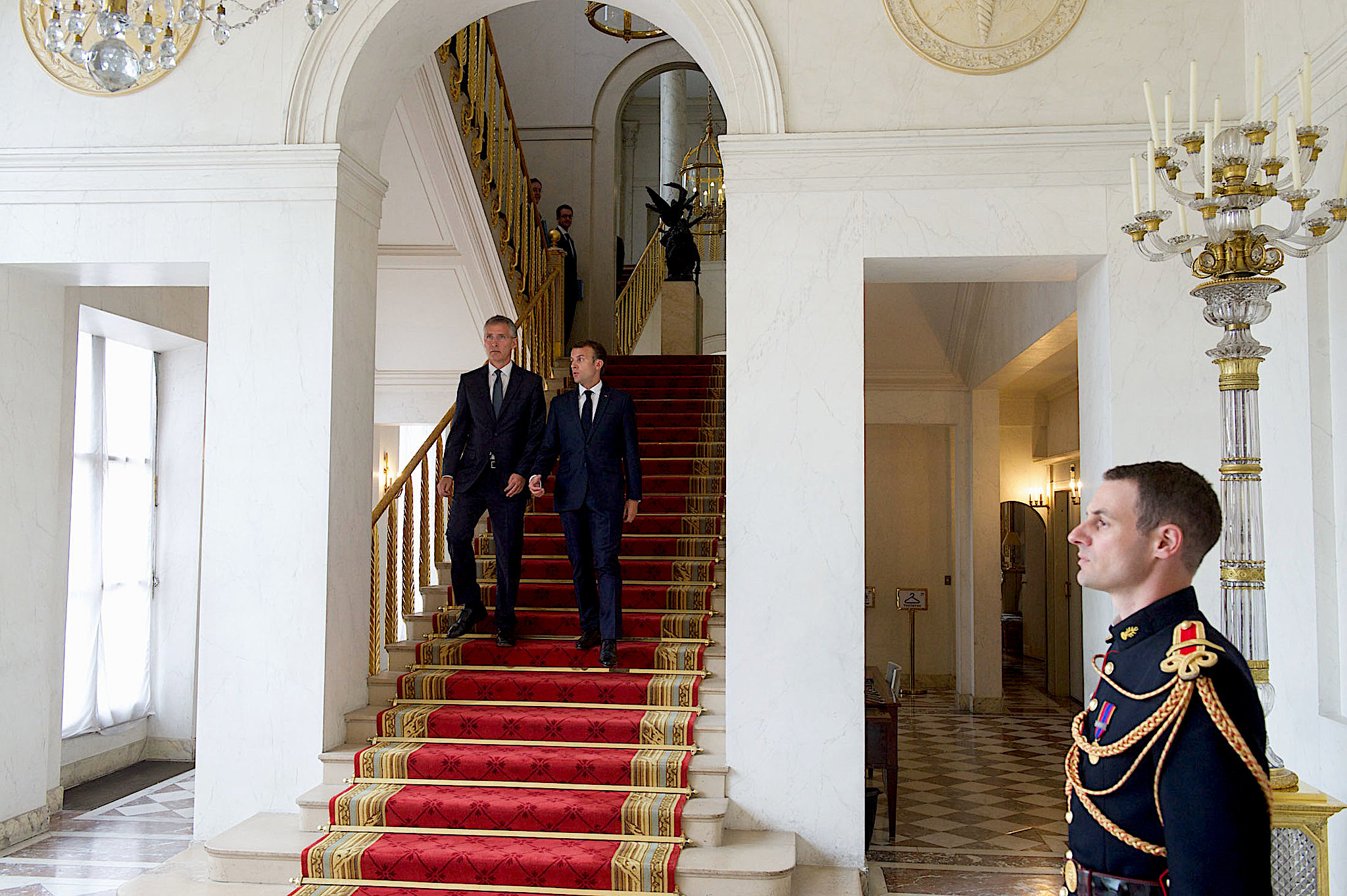
NATO Secretary General Jens Stoltenberg, left, meeting with French President Emmanuel Macron in Paris, 2018. (NATO)
By Patrick Lawrence
Special to Consortium News
 If Emmanuel Macron got one thing done above all others during his recent summit with Chinese President Xi Jinping in Beijing, it was to put the question of Europe’s place in the global order before a lot of people who would rather not think about it.
If Emmanuel Macron got one thing done above all others during his recent summit with Chinese President Xi Jinping in Beijing, it was to put the question of Europe’s place in the global order before a lot of people who would rather not think about it.
The French president, as is his habit, once again questioned Europe’s status in the Atlantic alliance, notably in his now-famous protest that Europeans cannot allow themselves to be “vassals” of the United States. “Strategic autonomy” must be the Continent’s aspiration, Macron asserted for the umpteenth time.
Suddenly, the future of the Continent is squarely on the table.
Of all the responses to Macron’s remarks, and there have been very many, those of Yanis Varoufakis are the most explosive I have seen.
The noted economist, who served as Greece’s finance minister when Athens resisted Brussels and Frankfurt in 2015, recounted Europe’s old aspiration to stand as a “third pole” between the U.S. and the Soviet Union during the Cold War. But he went on to assert — forcefully is not the half of it — that the last time strategic autonomy was anything more than a hollow dream was when Paris and Berlin declined to participate in George W. Bush’s invasion of Iraq in 2003.
“It’s not that the European Union is a vassal to the United States,” Varoufakis remarked after Macron returned to Paris. “It is worse than a vassal. Vassals had a degree of autonomy under feudalism. We are serfs. We are not even serfs, who had certain rights under feudalism.”
I understand Varoufakis’ point. Europe’s capitalist oligarchs — his term —have too great an interest in U.S. hegemony for the structure of power to change.
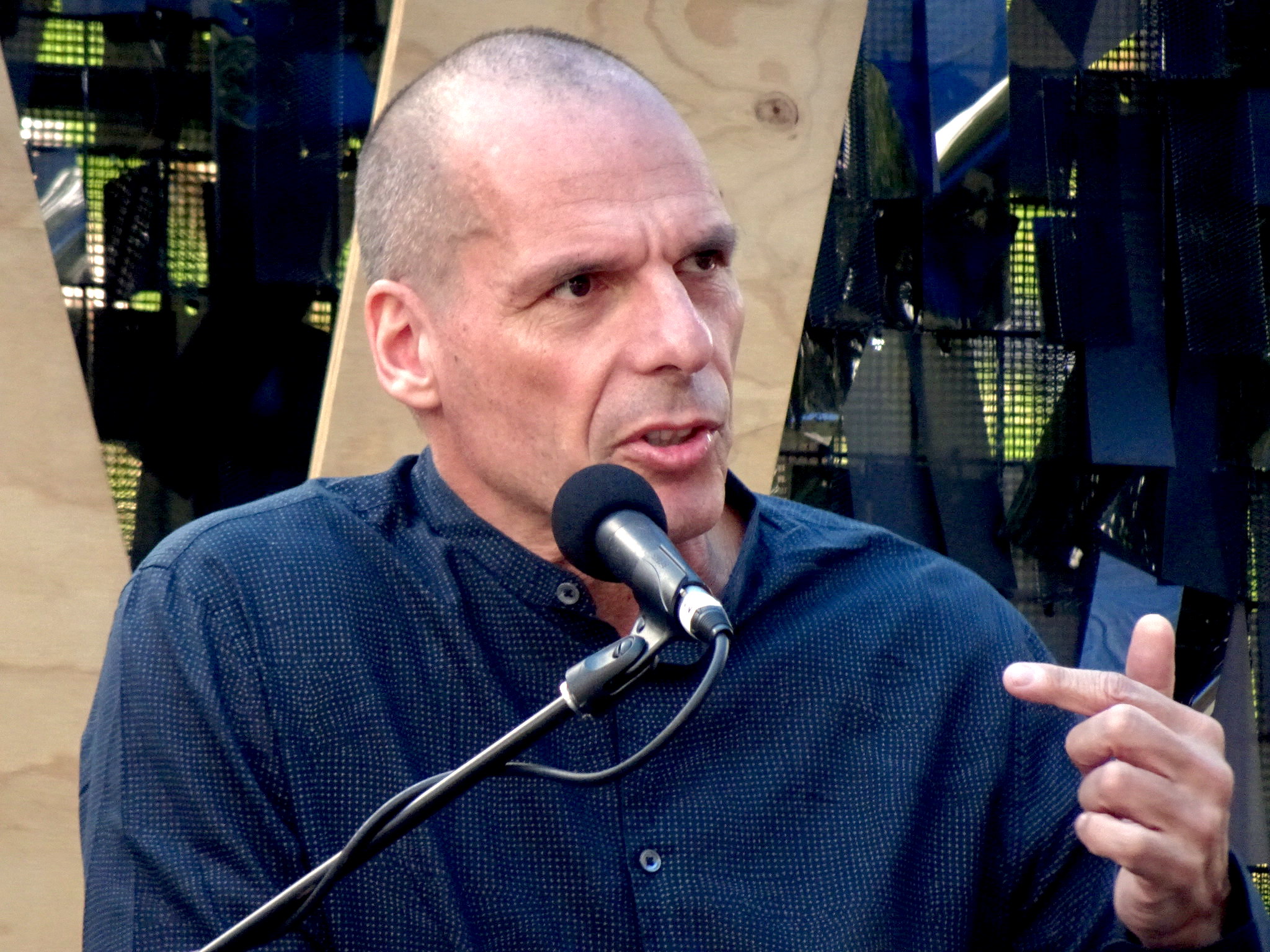
Yanis Varoufakis in 2020. (Michael Coghlan, Flickr, CC BY-SA 2.0)
But I think Varoufakis, for whom I have the greatest respect, missed a couple of points. One, all power structures are dynamic: There is no such thing as stasis in politics. Two, we have to think of Europe today in terms of a destiny that is far more compelling than the power hierarchies of any given period.
Let’s call this a third miss: Varoufakis also neglected to consider the evident decline of American power in our time.
Europe’s future looks different when we consider these factors. I addressed them to a European audience gathered in Switzerland at roughly the same time Varoufakis was recorded for DiEMtv. Consortium News made that video available two weeks ago. It can be viewed here.
What follows is an edited version of my remarks in Switzerland, delivered on April 12. The gathering was sponsored by a publishing cooperative that brings out a journal in English (Current Concerns), German (Zeit–Fragen), and French (Horizons et débats).
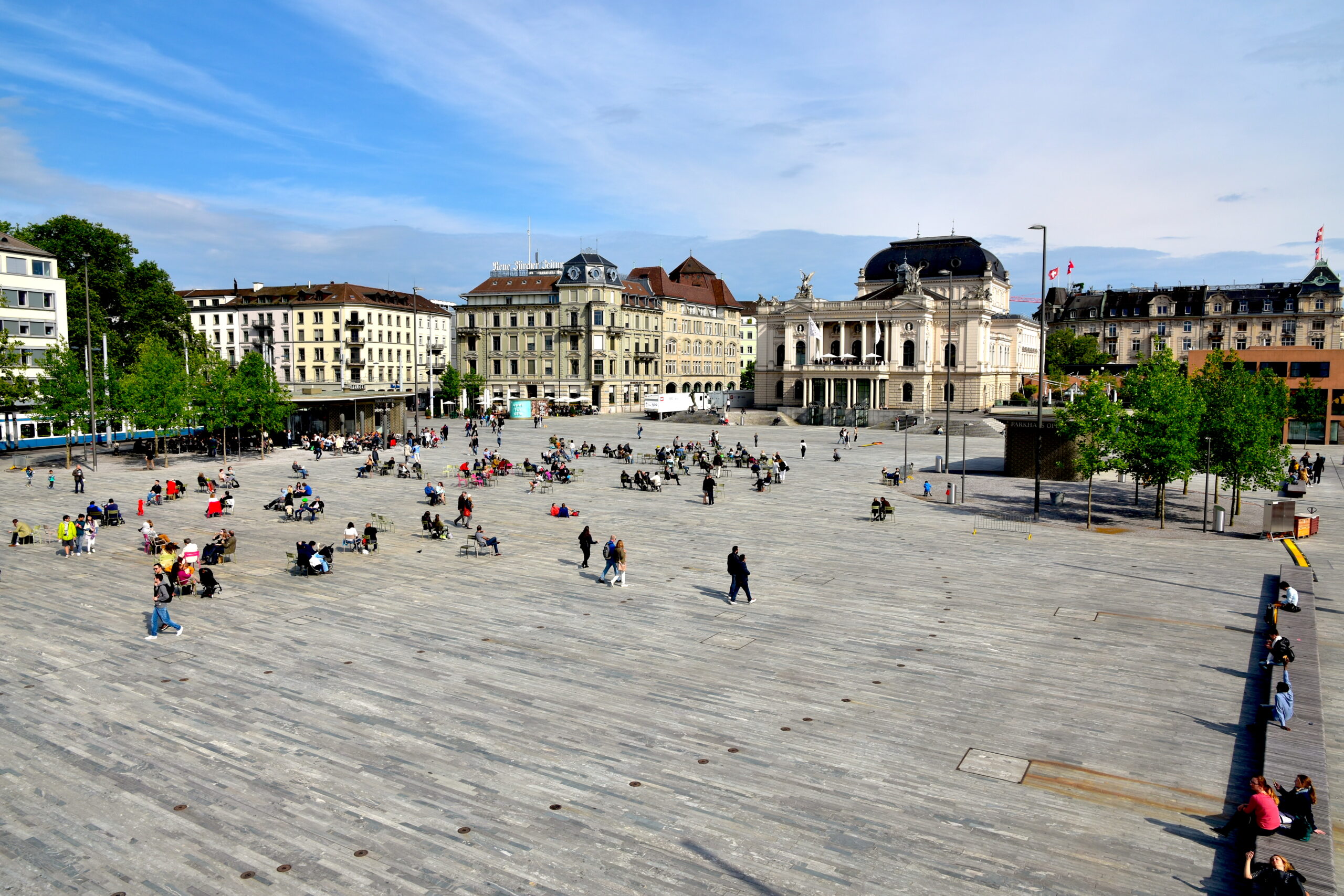
Sechseläutenplatz in Zürich. (Roland Fischer, Wikimedia Commons, CC BY-SA 3.0)
China, Eurasia & Europe’s Destiny
My topic today can be described many ways. A writer of newspaper headlines might settle on “China’s great leap,” or “China and the emerging world order,” or “China and ‘the new world order,’” or “China, the Eurasian landmass, and Europe’s destiny.”
I think what China’s recent emergence — not just as an economic power but as a diplomatic power — will mean for Europe is the topic I most want to explore. “How do we adjust to this ‘new world order?’” I was asked as I prepared to fly to Zurich. “In Europe we don’t realize what is going on.”
And there’s our headline: “What is going on?”
Let me begin with three documents the Chinese Foreign Ministry made public in February, not quite two months ago. As I wrote at the time, there seems little question that there was a lot of design in the publication of these documents.
They were issued over the course of five days, but I think they are intended to be read as one, and — very important — in the order they were made public.
I assign this design to Wang Yi, China’s top foreign affairs official, though not formally foreign minister. Wang has emerged over the past couple of years as an intelligent, serious, first-rank statesman, and goodness knows how few of these we have these days.
Three Documents
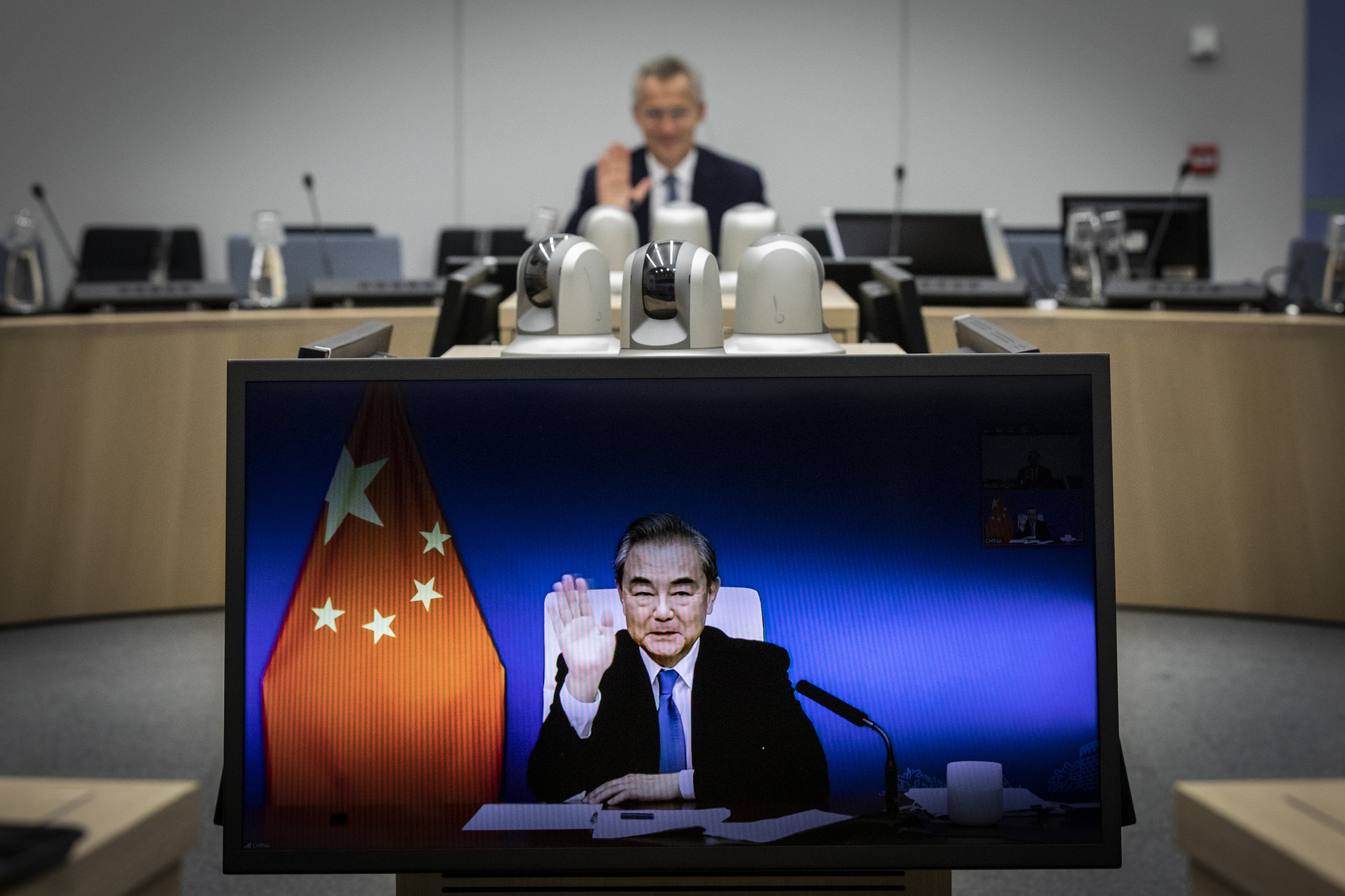
NATO Secretary General Jens Stoltenberg meeting virtually with China’s Minister of Foreign Affairs Wang Yi in 2021. (NATO)
The first of the Foreign Ministry’s communiqués, made public on Feb. 20, is a sharp, harsh attack on America’s conduct abroad for the whole of the postwar era. It is titled “U.S. Hegemony and Its Perils.”
“Since becoming the world’s most powerful country after the two world wars and the Cold War,” it begins, “the United States has acted more boldly to interfere in the internal affairs of other countries, pursue, maintain, and abuse hegemony, advance subversion and infiltration, and willfully wage wars, bringing harm to the international community.”
What follows is 4,000 words of historically informed vitriol. There is even a mention of the Monroe Doctrine, as the Chinese analyze the past two centuries of America’s mistreatment and exploitation of Latin America and the Caribbean.
One day later the Foreign Ministry issued “The Global Security Initiative Concept Paper.” This is a 180–degree turn in tone from the encyclopedic critique of U.S. hegemony. Beijing now turns its attention to constructive contributions to a new world order. If the anti-imperial paper looked back, the global security document looks resolutely forward.
This is from the third paragraph of the introductory section:
“This is an era rife with challenges. It is also one brimming with hope. We are convinced that the historical trends of peace, development and win-win cooperation are unstoppable. Upholding world peace and security and promoting global development and prosperity should be the common pursuit of all countries.”
Three days after putting out “Global Security,” the ministry made public the People’s Republic’s views on the Ukraine crisis — the “peace plan,” which is a peace plan only in the minds of American officials and American journalists.
Wang Yi first mentioned this document at the Munich Security Conference a short time earlier.
It is called “China’s Position on the Political Settlement of the Ukraine Crisis,” and that is all it is — a statement of China’s position. It begins, “Universally recognized international law, including the purposes and principles of the United Nations Charter, must be strictly observed.”
This is wholly in keeping with numerous other statements Beijing has made over the past year. The ministry’s evident intent is to apply the principle to the specific case of Ukraine. It includes 12 points, ranging from a ceasefire to negotiations, to a reconstruction program.
Beijing’s purpose is not to suggest what to do about Mariupol or Bakhmut or where postwar lines should be drawn on maps. That would amount to the kind of interference in others’ affairs China has stood against since the 1949 Revolution. It is to state where Beijing stands on Ukraine. Full stop.
As I mentioned just earlier, I think we should read these documents together and in the order in which they were published. If we read them in this manner, it does not seem too difficult to discern Wang Yi’s design. They are more, in other words, than the sum of their parts.
Saudi-Iranian Accord
Three weeks after the Foreign Ministry made these documents public, Wang surprised the world when he sponsored the stunning accord the Saudis and Iranians signed in Beijing, normalizing relations after many years of animosity —an enmity that defined the Middle East in many ways.
And since then, of course, we’ve seen the Xi–Putin summit, a three-day affair [in Moscow, March 20–22] that is probably the most important, or at least among the most important of the 40 meetings the two leaders have had as national leaders.
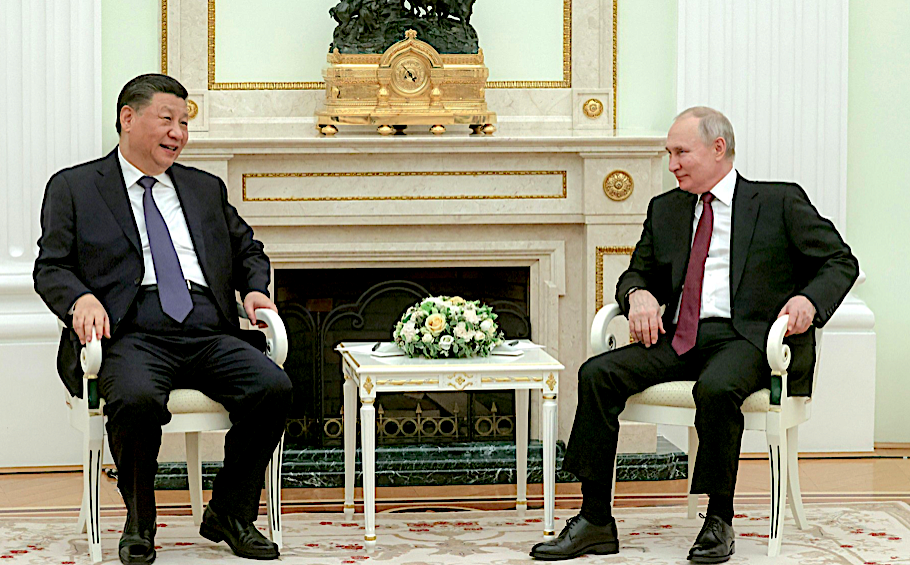
China’s President Xi Jinping with Russian President Vladimir Putin on March 20. (Sergei Karpukhin, TASS)
Wang, being in my reading a clever, resourceful and determined man, figured these events into his design, too, if I am correct about all this.
The first paper addresses the grave state of disorder into which American primacy has led the world — the disorder of “the rules-based order.” The second gives us the principles by which this disorder can be remedied. It is in effect an outline of the new world order China has made its priority, I would say at least for the past two years.
The third paper takes us from principles to how China will put its thinking into practice. This is how I read the three.
And a short time after Beijing makes the documents public, two events that, in one dimension, stand as examples of what China means. So, the problem, the solution in principle, the solution in practice, examples of the solution in practice.
At this point I should mention a piece published in Global Times, which can be read as a reliable reflection of official Chinese perspectives.
This piece appeared a day after Xi and Putin concluded their summit. “China’s diplomacy has pressed the ‘accelerate button,’” it begins, “and sounded the clarion call in the spring of 2023 with a series of major diplomatic activities that bring positive changes to a world in turbulence.”
In other words, China has grown very worried that the disorder of the “rules-based order” has got dangerously out of hand. And now that the Saudi–Iranian accord is signed and Xi has made China’s Ukraine case clear in Moscow, Beijing is intent on more such initiatives.
Coalescence of Non-West
At this point we have to realize, with no help whatsoever from our press and broadcasters because neither they nor the powers they serve can bear to face it, that a new world order is taking shape before our eyes.
I have long viewed parity between the West and non–West, as I put it in the columns, to be a 21stcentury imperative. This is now becoming a reality we must face, whether we have assistance or no assistance in this from our press and our public institutions.
All manner of relationships are elaborating, as I am sure you will know.
Bilaterally, there is India and Russia, South Africa and Russia, Russia and Iran, Iran and India, Iran and China, now the Saudi kingdom and Iran and the Saudis and China — this list goes on and on. Luis Ignacio Lula da Silva, Brazil’s new president, just finished a five-day visit to China.
Multilaterally, we see the expansion of organizations such as the Shanghai Cooperation Organization, the S.C.O., and the BRICS, the core group being Brazil, Russia, India, China and South Africa. We see a renewed insistence on adherence to the U.N. Charter and international law.
A few things are driving these elaborating relationships, this coalescence of the non–West. One, with the emergence of these nations as economic powers in consequence of their development, Western markets are no longer the only markets. For a long time, they were, and this was a source of power. Now they’re not. China is now the Saudis’ No. 2 market for oil, to take one of numerous examples.
Two, these nations share China’s and Russia’s alarm as to the extraordinary, increasingly violent disorder that has resulted from America’s insistence on defending its global primacy.
Three, and this is related to the second point, I detect a strong attachment to the principles of a new order as China articulates them. Although this is never mentioned, these are unmistakably based on the Five Principles Zhou Enlai first declared in his negotiations with India in 1953 and 1954 and then took to the Bandung Conference of nonaligned nations in 1955.

The Grand Mosque of Bandung with its twin minarets, adjacent to the city square in Asia-Afrika Street, 2008. (Prayudi Setiadharma, Wikimedia Commons)
They are, of course, mutual respect for territorial integrity and sovereignty, non-aggression, noninterference in the internal affairs of others, equality and peaceful coexistence. Apart from the three documents I mentioned previously, the essential statement of these principles, the first outline of a new world order, lies in the “Joint Statement on International Relations Entering a New Era,” which was made public during Vladimir Putin’s summit with Xi Jinping on the eve of the Beijing Winter Olympics last year.
As I’ve asserted severally, I count this the most essential political document to be advanced so far in our century.
This statement, too, was very long on Zhou’s Five Principles without mentioning Zhou. (And I do not know why his name and his work are never specifically invoked.)
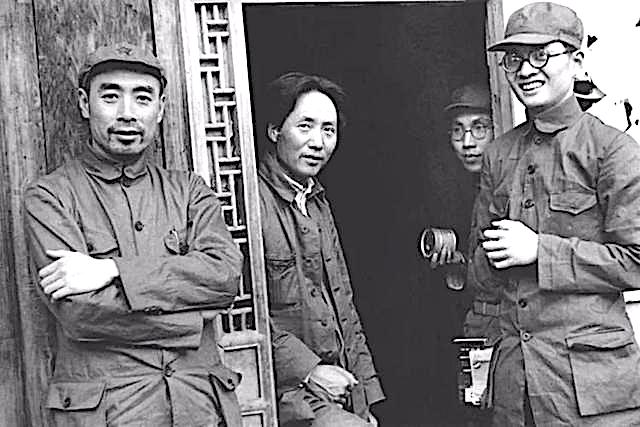
Zhou Enlai, left, Mao Zedong, center-left, and and Bo Gu, first from right, in Yanan, 1935. (Public domain, Wikimedia Commons)
If we pause to think about it for just a moment, these principles as they are included in these documents are American foreign policy turned almost exquisitely upside down.
And here I must make a point we cannot allow ourselves to miss: It seems especially pertinent for Europeans: There is nothing anti–Western or even anti–American in what is going on in the non–West as we are considering this today. I think the non–West altogether would welcome American and European participation in the making of a new world order suited to our century.
But this cannot mean a continuation of half a millennium of Western superiority or 75 years of American hegemony. This means one thing: It is up to Americans and Europeans to decide if they will participate in this grand project or stand against it.
A Symbiosis for Europe to Consider
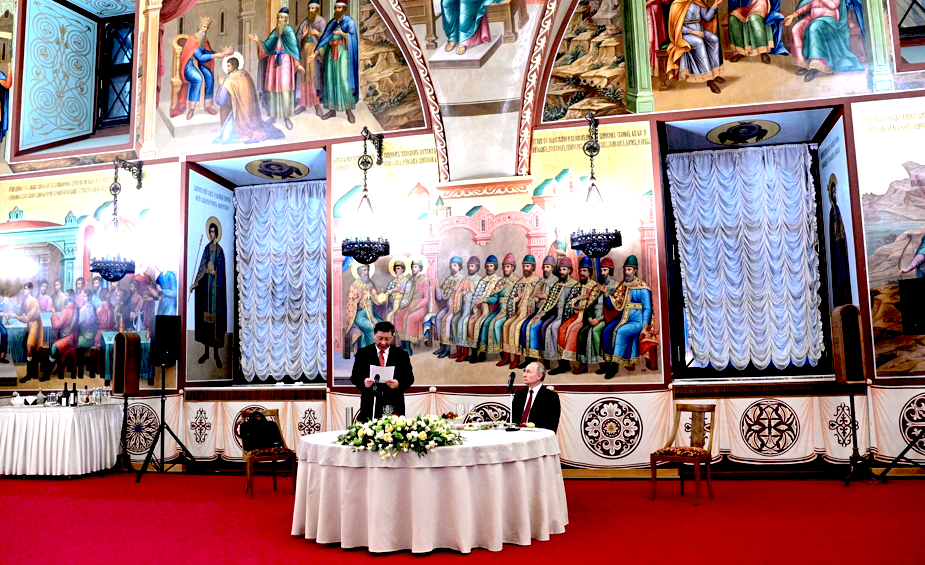
China’s Xi Jinping making a statement at a state dinner in his honor in Moscow in March. (The Kremlin)
For the moment and for the foreseeable future, I would say, the nations most essential to developing a new world order are China and Russia. This is why and where Europeans, I think, need to begin learning how to think for themselves.
There is the question of size. China’s economy, depending on how you count, is either the world’s largest or second-largest. It has without question the world’s largest industrial base, and it is advancing in such fields as high technology at such a rate that the Americans can think of no way of competing with China other than to subvert its technological progress.
This is what we used to call “infra-dig” — “beneath dignity” — but there it is. This is American policy in 2023.
The Russian economy is much smaller, but it is a major producer of oil, gas, minerals, wheat and other resources. So there is a symbiosis. Bilateral trade and investment are no small part of the relationship. Putin and Xi talk about it each time they meet.
Another factor is one of perspective and geopolitical position. Moscow and Beijing are both on Washington’s enemies list, depending on the day of the week one or the other Public Enemy No. 1 or No. 2. Naturally they have a strong sense of common cause — not, once again, in defeating America or the West but of superseding American hegemony.
Halford Mackinder & Eurasia
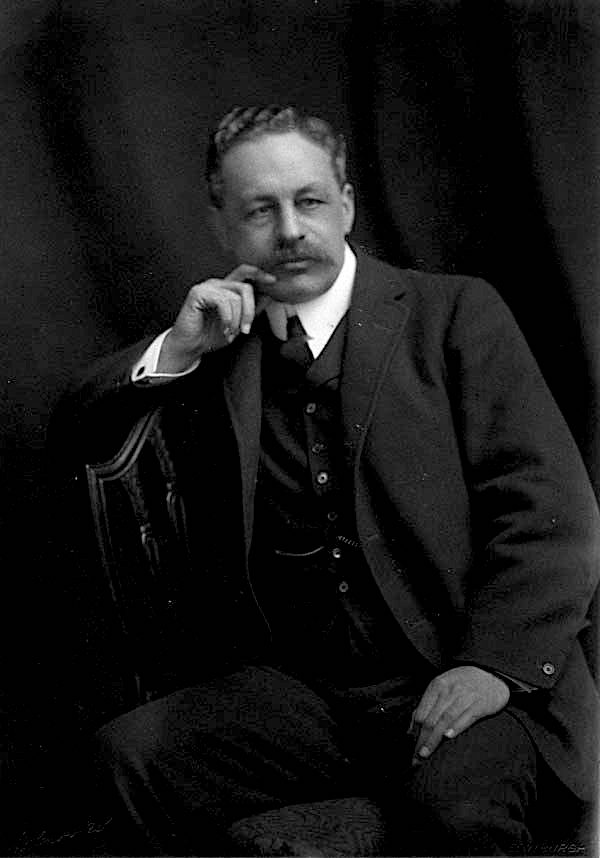
Halford Mackinder, undated. (Library of the London School of Economics and Political Science, Wikimedia Commons)
Now we come to a topic of special importance.
China and Russia account for the vast majority of the Eurasian landmass. We should understand this in the context of Beijing’s Belt and Road Initiative, for instance. Russia and the Central Asian republics, along with Iran and indeed Syria and other such nations, will be important links as China develops its plans for the BRI. And as we all know, the final terminus — or termini — of BRI are the cities and ports of Western Europe.
I do not know if Halford Mackinder has much of a readership in Europe, but we must consider his thinking now.
Mackinder was primarily a geographer, who lived from 1861 to 1947 and gave us, for better or worse, the concepts of geopolitics and geostrategy. Henry Kissinger, for better or worse, is among the many public figures to claim him as an influence.
Mackinder’s titled his most celebrated work “The Geographic Pivot of History.” This was an essay he submitted to the Royal Geographic Society in London in 1904. In it he reasoned that the world was centered on what he called the World Island, which extends from East Asia through to Europe and Africa north of the Sahara.
North and South America, along with Oceania, were given the status of Outlying Islands, while Japan and Britain were Offshore Islands. This seems a little off to me, but let us stay with the thesis.
The Heartland of the World Island, which he also called the Geographic Pivot, stretches from the Yangtze to the Volga, and is today just as Mackinder had it —the world’s most populous and richest-in-resources region.
In a later book, published in 1919, Democratic Ideals and Reality — which I have always found a curious binary — Mackinder famously had this to say:
“Who rules East Europe commands the Heartland; who rules the Heartland commands the World Island; and who commands the World Island commands the world.”
Mackinder seems to be a little “old hat” among Americans these days, but I never pay attention to fashions, and to the extent he may be dismissed as passé I suspect it is because what he had to say a little more than a century ago is too painfully evident now for the West’s big thinkers to bear.
Americans can pretend all they like that the Mackinder thesis has no contemporary pertinence, and as in so many other ways, they don’t pay so heavy a price as others for their errors. It will be far costlier and more consequential if Europeans flinch from the implications of Mackinder’s thinking.
The Great Promise of Europe’s Future
We come to the question of Europe’s fate and back to our initial question: What’s going on? And what are Europeans, supposed to do?
The question that may be obvious by now, the question of fate, is simply stated: Does Europe’s destiny lie in its Atlantic identity, or is it better understood as the western flank of the Eurasian landmass?
There is a certain “either/or” implicit in this question as I have stated it, but I don’t think the most logical answer involves any such thing. I see the great promise of Europe’s future, assuming its leaders are sensible enough to see it themselves —and this is a very sizable “if,” I realize — as lying in its position as both the eastern edge of the Atlantic world and the western edge of Eurasia.
In this way it could serve the very highest purpose as the 21st century evolves — as a sort of mediator between West and non–West. I think Havel, a person of considerable vision, thought in this way, if he did not speak and write in precisely these terms.
Reclaiming Autonomy

NATO Secretary General Jens Stoltenberg visiting a training program for the Ukrainian Armed Forces at Lydd Army Camp, U.K. in November 2022. (NATO, Flickr, CC BY-NC-ND 2.0)
As to what you are supposed to do, I am not in the business of telling anyone what to do — apart from American presidents and secretaries of state, of course — but I will share some thoughts with you a little in the way the Chinese put forward their views on Ukraine — with a proper sense of distance and detachment.
I think it is vital, and well within reach, for Europe to begin cultivating—reclaiming, if you like — a sense of its autonomy in foreign policy and security that it has not known since the days of de Gaulle, Churchill, Antony Eden and other figures of their generation. I have very little time for Emmanuel Macron, to put my point mildly, but he has been right about this question many times in the past.
Setting aside Macron’s many faults, he has articulated some important positions: Europe must regain its autonomy from the U.S., Europe must take responsibility for its security, Russia must be understood as part of Europe, Europe’s destiny is inextricably involved with Russia.
The important point here is that such ideas are within Europe’s reach. They simply require leaders of greater character than Macron to advance them, develop them, win acceptance for them, and begin putting the into practice.
Europe missed a great opportunity to play such a role when it so hastily followed the U.S. into the proxy war in Ukraine. It should have insisted vigorously that Russia’s security interests be acknowledged when the reckless fools in the Biden administration insisted they could be ignored.
An enduring settlement of benefit to all sides slipped through the West’s fingers. Europe could have grasped it. This is a great shame. It is easy to see what an immense difference Europe could have made for itself, for Ukrainians who now suffer — for the course of history altogether.
In this same line, Europe still has a chance to admit the truth about NATO and act according to this truth. This alliance is outdated, it is in no way to be described as defensive, and proves now to be an incalculably destructive force.
Europe has another chance now to make the kind of difference it could make were it to determine to follow a course of its own making.
Europe’s relations with China still hang in the balance, if I read things correctly. It should make the most of this moment by declining to participate in the Sinophobia that now defines America’s policy toward the mainland.
It can accomplish this by way of diplomacy and also in the economic sphere: By embracing the BRI project, for instance, and by repudiating Washington’s ridiculous, cynical demonization of Huawei for no other reason than Huawei’s leadership in the field of 5–G technology.
Further Democratization
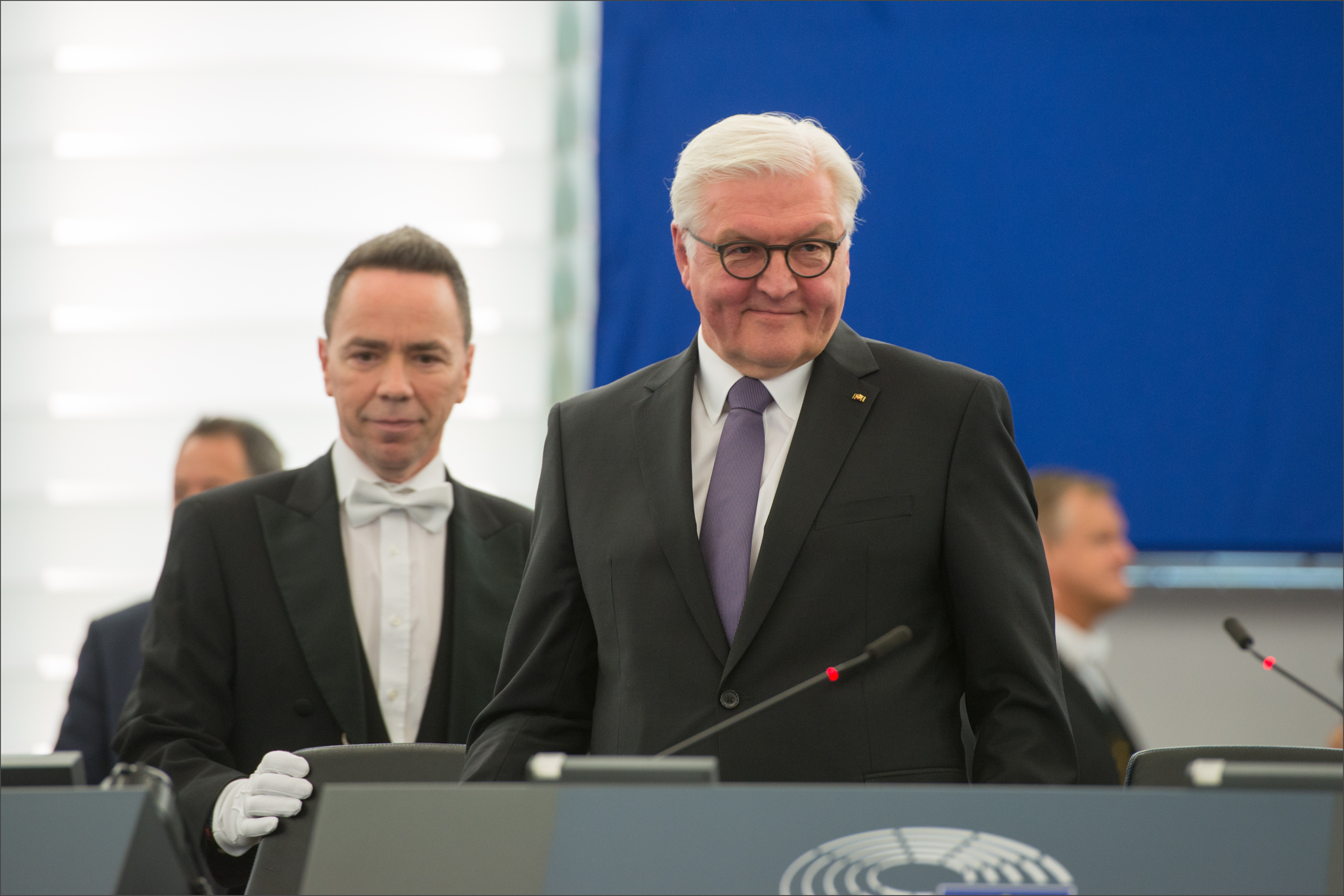
Frank-Walter Steinmeier addressing European Parliament in 2017. (European Parliament, Flickr, CC BY-NC-ND 2.0)
I’ll conclude with two thoughts as to Europe’s domestic arrangements. They both concern ways to advance the democratization of the Continent.
Some years ago, while he was Germany’s foreign minister, Frank-Walter Steinmeier developed quite an elaborate plan within the ministry for the renovation of German policy abroad. This was called “The 2014 Review.” It was finished in the autumn of that year, and Steinmeier presented it in the Bundestag in the early months of 2015.
There were many dimensions to this plan, but the one that seemed to me most original was Steinmeier’s proposal to subject foreign policy to direct democratic review and assent, so dismantling the traditional wall that separates foreign policy from the will and aspirations of the citizenry.
I don’t know where “The 2014 Review” sits in German discourse today. Some scholarly papers have been written on it, I discovered when I looked it up before joining you. But it seems an excellent idea.
My second concluding thought concerns the way the European Union works. To my mind the three-legged stool — administration in Brussels, finance in Frankfurt, parliamentary politics in Strasbourg — was long ago broken. As I like to ask American friends, when was the last time you read a newspaper story with a Strasbourg dateline?
To put a complex thought simply, technocrats and bankers have taken over the EU and it needs to be re-democratized.
I imagine that these kinds of ideas could make a significant difference in determining Europe’s future. It is a question of the goal but also getting to the goal.
And these are things Europe should do.
Patrick Lawrence, a correspondent abroad for many years, chiefly for the International Herald Tribune, is a columnist, essayist, lecturer and author, most recently of Time No Longer: Americans After the American Century. His new book Journalists and Their Shadows, is forthcoming from Clarity Press. His Twitter account, @thefloutist, has been permanently censored. His web site is Patrick Lawrence. Support his work via his Patreon site. His web site is Patrick Lawrence. Support his work via his Patreon site.
The views expressed are solely those of the author and may or may not reflect those of Consortium News.

With Respect: Dear Senator Wong,
The Australian Government has made all Australians to be partners with the U.S., a Nation responsible for many unjust political and military interventions against many other Nations; A Nation that has some 850 military bases around the Earth; A Nation that has published intentions, “To War against China once Russia has been weakened”The war in Ukraine, engineered by the U.S. is meant”To Weaken Russia”: this is their published intention.
Much is written about “The Force posture” agreement, However, one concomitant aspect is totally overlooked; In order to keep faith with U.S. instruction The Australian Government will be forced to enlarge all of our Military establishments, in order to “defend”? ourselves against China. Australia is now a forward supply and communications base, with U.S. autonomous Bases, over which Australia has no jurisdiction or Sovereignty. Make no mistake, the U.S. fully intends this War with China, when it starts, Australia will be a legitimate target. The Australian Government has stepped up its advertising to increase Military personnel, this will fail, so within two years from now the Australian Government will be obliged to Legislate for urgent conscriptions and call ups. In other words Australian sons and daughters must be trained to kill or be killed, there is no sugar coating for this. China is not threatening war against any-one why must we fight because the U.S. is doing so?
Why waste such large sums of money, whilst the Australian population has dire need of health care, education and training, and yes, housing too. Have we taken leave of our sensibilities?
Looking forward to your reply, with warm regards. Thomas W. Adams.
Excellent article, as usual.
How Varoufakis could possibly miss the leading points 1,2 and 3 explains Greece’s failure to resist the bail-outs at the previous crash.
> “This statement, too, was very long on Zhou’s Five Principles without mentioning Zhou. (And I do not know why his name and his work are never specifically invoked.)”
The reason seems obvious to me: avoiding domestic political disputes that are immaterial to the subject of these policy papers. Remember that Zhou Enlai became a non-person in the later period of Mao’s rule (and I presume of his immediate successors)
> “Europe missed a great opportunity to play such a role when it so hastily followed the U.S. into the proxy war in Ukraine. It should have insisted vigorously that Russia’s security interests be acknowledged when the reckless fools in the Biden administration insisted they could be ignored.”
The major European NATO powers did not “follow” the US — they were actively involved in the coup from the start (that Nuland didn’t really grasp the whole picture is nothing special). So it was the “reckless fools” of the Obama, Trump, and Biden adminstrations they went along with.
Excellent reading. Would that people of a caliber of Patrick’s understanding of events historical and contemporary occupy positions of power and influence in Europe, let alone the USA.
Excellent analysis, thank you Patrick!
Lots of wisdom here, but there is a brontosaurus flailing around in the room that no one has mentioned. It appears that Chinese leadership wants to mold a new world in which the UN’s principles are respected and countries cooperate rather than competing. Very good. But there are many crises converging on humanity now that can’t be solved, in fact will be exacerbated by what China has been doing domestically and wants to do abroad–grow economically, build all kinds of infrastructure, increase trade. I refer to climate change, plummeting biodiversity (just as critical as climate change though it gets less ink), overpopulation, what’s happening to the oceans, plastic pollution etc.
The reality few want to face is that there are too many humans on Earth for us to live like people in rich nations do, and the impact of the richest segment on the planet, on ecosystems, is unsustainable. Check out the work of Richard Heinberg and Simon Michaux. Trying to replace our current gargantuan power system with renewables would necessitate an enormous buildout of solar panels, windmills, batteries and electric cars, which would have to be powered by fossil fuels as that’s what we have now. This would cause such a spike in emissions, it would likely push us over red lines. It would also require a huge increase of mining, which is pretty much always and necessarily toxic and unjust–and the Earth likely hasn’t got the materials even to build out the first generation of this huge system.
So there are two choices, if you’re aware of this. One is to work cooperatively worldwide to use what resources we have to extend the bare necessities to everyone, which would require a reduction in “standard of living” for the richest half of humanity, and a large reduction for the richest. It would also require cutting the US military down to size (a tenth of what it is, say). And meanwhile we would be converting our economies so that commuting becomes rare, switching to a relocalized economy, to regenerative polycultural agriculture, etc. The other alternative is reserve the remaining resources for the rich, and allow the poorest half to die of starvation, disease, exposure, whatever. Naturally this is the course the powerful, at least in the west have chosen–those who are aware of these realities, that is. Meanwhile they cover up with an ocean of greenwashing and pretense.
You are right Mary in everything you said. There are so many topics and discussions and theories and solutions, but not one of them addresses the “too many humans on earth” scenario and the finite resources. And sorry to say that your “two choices” are sadly untenable, except for the second one.
European Union is on its deathbed. This colossus who grew up really fast in a short time, got very centralised and corrupted, cannot sustain itself much longer. Not only that but there is a great divide between Western and Eastern Europe, a divide that has its roots in the Cold War. There are also huge cultural differences, mainly with the West still looking down on the East with its mostly Christian Orthodox values. Eastern Europe has dreamt of capitalism for the better part of 80 years, while Western Europe is starting to demonise it. Eastern Europe abhors anything resembling Marxism or Neo-Marxist ideas (like Varoufakis’ idea of “forcibly taking private means of production” and giving it back to the people, as he once stated in an article from The Guardian) , while the West is steadily embracing Neo-Marxist values.
All of these huge divides will only lead to the demise of the E.U.
They will fail, Patrick. 500 years of absolute power is a huge legacy to overcome. They won’t overcome it until such time as all the little mice they despise rise up and bite them in the ass.
I’d posted here before on the likelihood that Macron probably had his own ideas of “strategic autonomy” for Europe before he even met Xi. The Chinese leader’s views, I thought, probably helped reinforce Macron’s conviction. If Macron nevertheless lacks the will to transform his vision to reality, then it’s incumbent for progressive writers to back him with articles like this one. So, again, well done, Patrick.
Europe had a choice to become a prosperous and thriving western peninsula of Eurasia but it foolishly chose to commit suicide by remaining a US vassal.
But unlike Fukuyama I don’t ascribe to end of history and agree with the author that, given the right leadership, Europe can navigate back to the right course. Especially so because China/Russia/non-west are NOT fundamentally anti-west. But in the end, Europe has to come its senses first.
BRAVO!! Many bravos for this fabulous piece which lays out a path for humanity in comprehensive words we can all comprehend. It would be nice to think that some of the people in our executive branch and our Congress will read this and start to at least try to discuss it with others so that the stultifying grip of war and hegemony can start to crack. I do hope Europe’s leaders start to think along these lines which could encourage US leaders to do some actual thinking – something they have been loath to do for quite a while.
Thank you CN for this important publication. And thank you Patrick Lawrence for your clear and vastly important explanations!
Great article. Like much the material l read commenting on our descent into the abyss it shows a strong grasp of politics, economics, technology, etc. None, however, show the slightest interest in biology. Growing up in Toronto l was a naturalist of sorts, as were many of my generation. It was recognized that humans were part of the natural world and knew that issues of race, tribe and family are crucial. Multiculturalism is not natural (Bluebirds and Starlings don’t mix).
I feel sick thinking about Europe’s fate. Demographically, the die has been cast through mass migration. England is no longer England, and never will be again; same with Germany, France, Scandinavia, Ireland. I see no future for Europe as Europe. Most people don’t know, and could not care less. I say thank God for Putin.
If you look at the (pretty obvious) difference between bluebirds and starlings, you see quickly why they cannot mix. Looking at differences within the human kind, there is absolutely no(!) reason, why they could not mix.
They did so all along our history/ evolution.
Somehow your comment appears “a little” nationalist, and perhaps even racist.
And by the way- if you observe nature a little closer, you very well discover multiculturalism/ vital communities; all over the globe.
In the air, on the ground and underground, and in the waters.
Thank you for reflecting ^^
And, US citizens, like EU citizens, probably for the most part do not aspire to hegemony. Such considerations are only for the powerful, the wealthy powerful. And so saying, everything then comes into focus. The steadfast stubbornness of US – “Western policy’ – is not for the benefit of the majority mass of its citizens, it is for the continued stifling greed of the wealthy powerful.
Many, from the late 19th century onward plainly spelled this out, but that was before the era of the mass media we have today and its ability to cast a magical spell of powerlessness upon its audience. To use a popular reference: the Dark Force we see swirling around the centers of power in the West, took up residence there some time ago, as Eisenhower tried to tell us as he left office.
The longer these greedy f#$%^rs determine to hold onto every last red cent, the more surely it is that they will even be relieved of that. The question now before us is, how many of us will they be able to convince to offer up our lives, and those of our children, to keep them ensconced in their obscene wealth and luxury.
I truly hope that Wang Yi’s fate (and woe to all of us) is NOT to become the Asian Chamberlain, advocating peace while the bloodthirsty butcher plots war.
Excellent remarks by Patrick Lawrence. All of us – humanity – could have a much more hopeful future if we would get on board that train, instead of trying to blow up the tracks. No, there are no guarantees in this existence, but at least we might divest ourselves of the self-inflicted wound of rule by force and violence.
Thank you (and CN + author of course) ^^
I totally agree!
Thanks CN for running this “over and above (infra-?)” article… and Patrick for creating it.
Europe’s diminution in WWII from “White man’s Burden” to geographical bit-player on the world stage ironic, to say the least!
In addition, thanks for condensing Wang Yi’s
solution to prevent Nuclear Holocaust (AKA Humanity’s END)… essential documents unlikely available to but a few CN readers!
Democracy in the collective West has atrophied to the point where it seems the only solution is in the streets. Frederick Douglas told us “Power concedes nothing without a demand. It never has and it never will.” The problem is Americans ability to think critically about how their government relates to the rest of the world has been practically eliminated via secrecy, censorship and lies. It’s very difficult to organize a population content with its servitude.
I’m not sure how true this is in Europe. Having a longer history of dealing with the problem of empire, maybe they will decide they’ve had enough of being subjugated by Uncle Sam and push back.
Thank you, Consortium News for the Wisdom and Sanity and Truth and most importantly the JOURNALISM you bring to those of us who are looking for it! My monthly contribution is priceless!!! So many of the citizens of the U.S. A. simply do not want to hear this.
There was a fourth miss by Varofakis in the DiEMtv hour long video. In his first 20 minute segment, he ultimately called Putin stupid for falling into the US trap. Though in his conclusion at the end of the program he somewhat made up for that, his initial comment in that regard ignored thirty years of Russia attempting to deal with the way the US ultimately decided to deal with Russia following the Cold War and the initial 5-6 years of leading it by the nose with detailed talk and promises of including the new Russian state in a restructured European security system. A la Brzezinski, the US opted, as it had vis-a-vis the USSR in Afghanistan, to lead Russia into a quagmire in Ukraine of protracted war. No Minsk, no addressing Russia’s December 2021 ‘red lines’, no peace arrangement in Turkey in March 2022. The US boxed Russia in with zero good options. One thing Varofakis avoided was a specific description of exactly what Russia should have done instead of deciding to invade in late February 2022. Though everything else he had to say was accurate, this part about Putin’s stupidity sounded like the scripted, obligatory negative thing everyone is ‘supposed to say’ before they proceed to make the case against US-NATO expansion to Russia’s borders.
I agree with your “scripted, obligatory negative thing” observation.
Basic integrity is an outstanding thread in this superb essay. Taking responsibility for your own affairs. Taking responsibility cultivating right relations based upon mutual respect and recognition each nation requires “equal opportunity.” As each nation has something to offer that other nations need. So clear is this harmonious and even practical vision that it sets in bas relief how astoundingly antiquated the colonial-minded “survival of the fittest” approach that characterizes that of the USA military-industrial-media complex approach. The essence of our shredded democracy. How sourly ironic the big outlaw in the world is the one insisting on a rules-based order which is their creation and theirs to destroy when it suits them. Terribly sad to me is expedient and arrogant nature of mind (the cattle rustling king of cowboys) endemic in USA leadership. The desiccated fruit of free market capitalism’s corporate, inc’s in-service training. Where themes like peace, harmony, cooperation, simple decency, Synthesis, truth. Honesty, real democracy, freedom, responsibility, maturity, ethics, fairness and justice, statesmanship, civics, humane-ness have been murdered off as unimportant meaningless fripperies. Intriguing actually. The more materialistic a nation/person becomes, the hungrier the spirit becomes. Showing its shadow aspect in unintegrated anger, raw rage, dis-ease manifesting in addictions, mass murder, mass incarceration, homelessness, book bans, train wrecks, extinctions… Sickness.
Wonderful piece!
A key and fatally flawed premise of the modern US Empire is the technocratic hubris that digital technology abolished space and geography (an implicitly the politics and economics they generate).
This essay so clearly exposes that intellectual fraud.
As several others have said, this should be widely read, first in Europe, then the US. All the ideas were on the table from many directions, but the strategic and human intelligence of this summary needs to sink in. There is no sane and hopeful alternative.
Isn’t the US just a stand-in for France’s (and even Europe’s) disdain for the English and how much they drive western policy?
After all even the American spook community will readily admit they are just junior partners to the much more apt MI-6.
I even have a suspicion that without the Brits America would not care as much about “stuff” worldwide and would somewhat withdraw from the role the State Department types envision for us that they will lead us to.
Brilliant.
“At this point we have to realize, with no help whatsoever from our press and broadcasters because neither they nor the powers they serve can bear to face it, that a new world order is taking shape before our eyes.” True that.
I have always believed that Russia and Europe should be good neighbors. This is simply common sense. After all, they share the same neighborhood. Where are you going to go? There is no moving away, much to Annalena’s chagrin.
Furthermore, Russia and Europe represent civilizations, some older, some newer. The US is more like a vulture capitalism management team. It’s understanding of civilization is facile. The US, of course, cannot countenance or even imagine Russia as a civilization. Rather, it views Russia merely as a source of raw materials that Russia possesses and it wants; the Russian state should be broken up and sold off, in their opinion.
And of course, America does not live in Europe. Instead, America seems to view itself like an absentee owner/landlord entitled to dictate rules and collect rent (or tribute). The fact that it thinks it owns Eurasia or has a say in its development is only evidence of its creeping dementia. The fact that some European leaders see things in this way is evidence of their full blown psychosis or self-serving ambition.
I wish every European citizen (translated as needed) would read this. Certainly, every member of of our Congress should! I feel like Wang Yi is going around the world singing, “All we are saying, is give peace a chance,” while we sing about “bombs bursting in air and our flag was still there.” (My, how those words in our national anthem articulate our hegemonic quest.)
There is some hope in that almost every person I speak to, in both the UK and EU … would dump the so called special relationship between the UK and US (I am a Brit) .. as I would. The people in general are decent, but I mock their policies, institutions and I despise their foreign policy .. however the younger generation are even more outspoken that I am … THIS IS NO DISRESPECT TO THE PEOPLE, we are being played and manipulated in the UK and the EU as well.
All i can say is, i hope all the european heads of state read this fine article and collectively acquire some common sense and logic. (Not holding my breath.)
The problem is not a lack of common sense of European leaders. But a matter of narrow self interests of the parasitic, ruling elite class.
I enjoyed Patrick’s informative article, and share a common fate of being permanently censored by Twitter. But I cannot escape the gloomy conclusion that humanity is now the precipice of another world war – nuclear war. Paradoxically, the way to prevent it is to state its inevitability, because on the trajectory it is going to happen.
Thank you Consortium News for giving me a voice.
While many of us are also cheerleaders for China’s peaceful geopolitical development, we need no hubris to state the obvious global realignments we read about in pubs. like Consortium news which have become ubiquitous on UTube and most progressive media.
Author does not note Europe is now in historic revolt led by France and it’s direction will also be determined internally. Academics and journalists will have no place in the new alignments unless our side-lined role is understood via mistakes we made in understanding China and Russia many years ago. with our racism and russiaphobia.
”Setting aside Macron’s many faults, he has articulated some important positions: Europe must regain its autonomy from the U.S., Europe must take responsibility for its security, Russia must be understood as part of Europe, Europe’s destiny is inextricably involved with Russia.
The important point here is that such ideas are within Europe’s reach. They simply require leaders of greater character than Macron to advance them, develop them, win acceptance for them, and begin putting the into practice.”
Wow! This is serious Chinese polemic. Unfortunately, however, one look at the Atlantic bloc and the likes of – Annalena Baerbok, Sanna Marin, Andrezej Duda, Jens Stoltenberg, Boris Johnson, et al. and my heart sinks! And that goes double for my own country – the UK.
For the present time at least the Euro elites are totally compromised and incapable of change, at least from within.
Great points, I agree.
As far as Macron’s statements re autonomy from the US: he appears to be catering to domestic political considerations, the timing is noteworthy. If the political blah blah translates into actual concrete policy, I will be pleasantly surprised.
HEAR, HEAR MR. LEE!
The US narrative is ingrained and has been for many decades. I don’t believe it will change in its
essentials. (See Joyce & Gabriel Kolko, “The Limits of Power”).
Large powers that have dominated the globe do not gladly just become secondary ones. I can hardly
believe that the Chinese are “serious” in their actions. I give them more credit than that. That said,
the opposition to the US and west is growing and must be accepted.
Like the UK, we can always remember when we ruled the world and how great it was (for us).Then.
Patric Lawrence’s words are golden. Paradoxically, what is happening in the direction to another and hopefully better world is the defeat of Ukraine. The dominoes of world leadership would in my estimation be sundered and new and better leadership will emerge.
You have absolutely put your finger on it, Robert. For all this to come true, NATO/Ukraine must lose. That’s the only way.